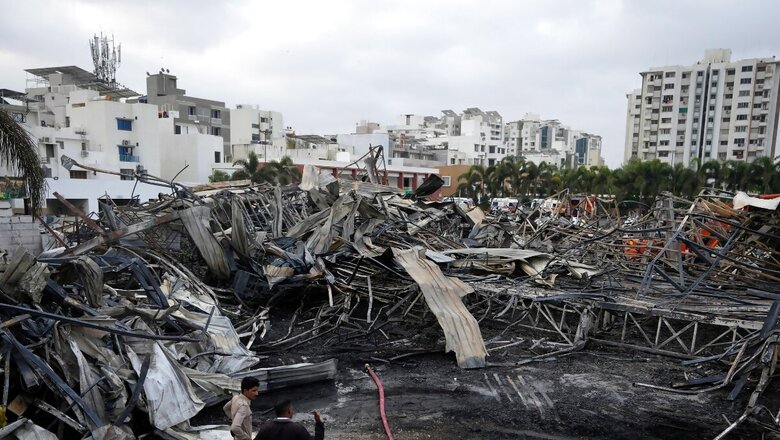
views
The scorching afternoon of May 25, 2024. The place is the TRP Game Zone of Rajkot, a centre of joy for youngsters. Suddenly, a fire erupts. The entire game zone, full of flammable materials, starts burning. Witnesses recall the shouting of children and adults amidst the flames. After a couple of days, news channels report at least 33 casualties.
The Special Investigation Team (SIT) investigation revealed a critical oversight: the game zone lacked a No Objection Certificate (NOC) from the fire department. Further fueling public outrage, a journalist from Gujarat uncovered a photo on the game zone’s Instagram page featuring the District Magistrate of Rajkot. The 180-IQ babu unintentionally (in all probabilities, intentionally) forgot to perform his duties.
Two days back, a fire broke out in a hospital in Delhi, taking the lives of 7 newborn babies. Neighbours had warned of the safety hazard but the warning fell on deaf ears. A couple of weeks ago, a billboard in the Ghatkopar area of Mumbai fell, claiming the lives of at least 35 people. The company that put up the hoarding claimed it to be the largest in Asia, and the BMC and Central Railway were not aware of its existence. Such brilliant ignorance pays well! The usual mudslinging between the BMC and the Central Railway to escape from accountability is still ongoing, by the way.
A year and a half ago, a bridge in Morbi collapsed, claiming the lives of over 150 people. Five years ago, a fire broke out in a coaching centre in Surat, taking the lives of 22 students. The subsequent investigation revealed that the commercial building had been constructed illegally 12 years prior. However, before government authorities could act, the building caught fire.
The same story can be repeated by changing the location, victims, and causes. These incidents occur due to the greed of business operators, the unaccountability of law enforcers, and the delays by justice providers. But one often overlooked factor is the absence of significant consequences. When illegal businesses succeed, the owners take all the profits home. Imagine if the game zone in Rajkot had not burned; the business owners would have made a healthy profit and taken it all home. However, when events like these occur, they do not face significant consequences. Their investments may be lost, and the business may be shut down. They might be jailed for a couple of years before a lenient judiciary grants them bail. But there is no significant downside. They can start a new business anytime soon under someone else’s name and once again put the public at risk.
Similarly, due to negligence or bribes on the part of law enforcers, they benefit when such illegal businesses grow. But, similarly, there is no significant downside either. “Bureaucracy is a construction by which a person is conveniently separated from the consequences of his or her actions,” a prominent thinker, philosopher, and businessman, Nassim Nicholas Taleb, says. The same holds true for politicians who favour unethical practices and pressure government departments. To make matters worse, delayed justice simply tests the patience of victims. Nowhere until this so-called modern time have authorities enjoyed such a lack of accountability (the UPSC aspirants might write a thousand-word boring essay on how to fix the system, but without addressing the core issue).
However, in the ancient civilisations that survived (until they changed this fundamentally), accountability and power went hand in hand. A person could not escape the consequences of his actions.
Revisiting the principles of ancient laws can offer a blueprint for modern governance. The oldest deciphered writing on Earth is the Code of Hammurabi. Written in about 1754 BCE by Hammurabi, the sixth king of Babylon, the Code covers major laws related to contemporary issues. “If a builder build[s] a house for a man and do[es] not make its construction firm,” rule #229 says, “and the house which he has built collapse[s] and cause[s] the death of the owner of the house, that builder shall be put to death.” The next rule says: “If it cause[s] the death of a son of the owner of the house, they shall put to death a son of that builder.” These rules can be extrapolated to commercial buildings, where builders and/or business owners must face similar punishments.
The pioneer of political science and economics in India, Kautilya, commonly referred to as Chanakya, also knew better about corruption. In his masterpiece Arthashastra, he refers to thirteen types of undesirable anti-social persons who amass wealth secretly, by causing injury to the population. These persons are corrupt judges and magistrates; heads of villages or departments who extort money from the public; perjurers and procurers of perjury; those who practice witchcraft, black magic or sorcery; poisoners; narcotic dealers; counterfeiters and adulterators of precious metals. “When they are exposed by secret agents,” Kautilya writes, “they shall either be exiled or made to pay adequate compensation proportionate to the gravity of the offence.”
In modern times, responsible government officials, whose lack of duty causes such incidents, must be forced to pay compensation to the victims.
It is time to evolve from a system that reacts to disasters to one that proactively prevents them by fostering a culture of accountability. Only then can we hope to prevent the recurrence of tragedies like those in Rajkot and beyond. The lessons from our past should guide our future: without significant downsides, there will be no deterrence, and without deterrence, there will be no change.
The writer is an independent columnist who writes on international relations, and socio-political affairs. Views expressed in the above piece are personal and solely that of the author. They do not necessarily reflect News18’s views.



















Comments
0 comment